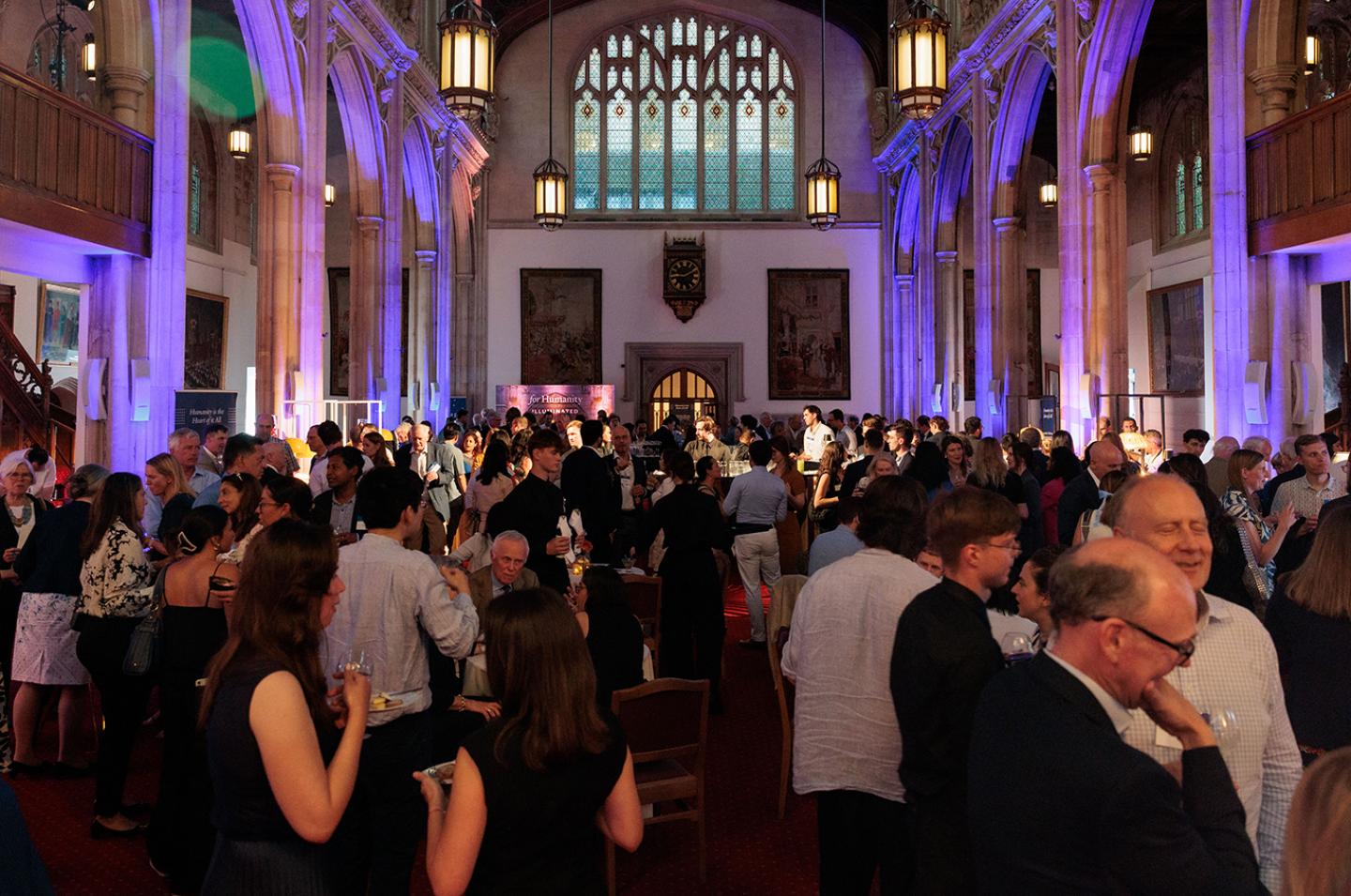In Yale President Maurie McInnis’s first international alumni event, speakers shared the crucial work happening at Yale to address the greatest global challenges of our time.
The attendees, including alumni, parents, and friends of the university, heard from speakers including a Divinity School professor engaging students in questions about how to live a good life, a former US Navy SEAL who enrolled at Yale College at age fifty-two, and two professors working to develop evidence-based climate solutions.
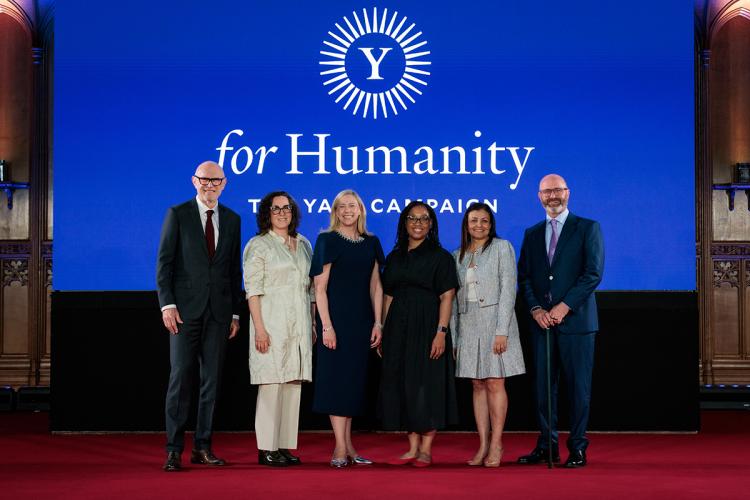
In her opening speech, McInnis made a case for the global value of higher education. While universities matter greatly to the public good, she noted, it can be a challenge to make their work feel tangible. Positive contributions from universities are often overlooked, even though they include technologies we use every day. The internet, satellite navigation, seatbelts, FM radio, X-ray technology, touch screens—all of these were developed from research in university laboratories.
“Our contributions aren’t always visible, nor do they happen overnight,” McInnis explained, offering an additional example: artificial intelligence. “AI technology didn’t appear fully formed in a Silicon Valley start-up,” she said. Rather, the AI tools changing our world right now are built on decades of research at universities.
And of course, she continued, the contributions of higher education to society aren’t confined to technological innovation. Universities like Yale have a long legacy of expanding our understanding of humanity by fostering vital conversations about our society, our culture, and our place in the world.
In the face of threats to that legacy, McInnis urged Yale’s alumni community to speak out about the positive impact of universities.
“One of the most meaningful things you can do for our university—and, frankly, for higher education more broadly—is to use your voice,” McInnis said. “Because when you speak, when you share what Yale gave you and what it continues to give to the world, people listen.”
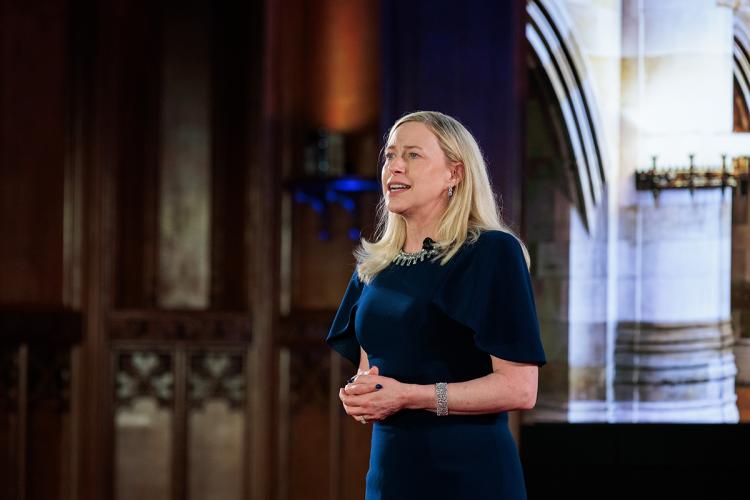
Miroslav Volf: Asking the Big Questions
Miroslav Volf, the Henry B. Wright Professor of Theology at Yale Divinity School and director of its Center for Faith & Culture, called on the audience to reflect on what it means to live a life worth living.
In a time of rapid technological advancement and rising authoritarianism, Volf said, society is choosing to invest heavily in expanding human capabilities and losing touch with the deeper moral and existential questions that give life direction.
“We have become experts in means,” Volf said, “but amateurs at ends.”
It’s why Volf founded the Yale Center for Faith & Culture, which is motivated by a vision of a “world in which every person can wrestle with life’s most important questions and take hold of a life worthy of our humanity.” It’s also why he developed Life Worth Living, a popular Yale College course that now anchors a broader curriculum taught at more than seventy institutions worldwide.
The course has inspired a global movement and a bestselling book, inviting people everywhere to define their own vision of a life lived not just for themselves, but for humanity. Volf concluded by challenging the audience: articulate your own vision of a life worth living.
Sparkle Malone: Calculating True Net Zero Emissions
Sparkle Malone, assistant professor of ecosystem carbon capture, spoke about her work researching natural carbon capture, a critical strategy in responding to climate change.
“We have known for a long time that there is too much carbon in the atmosphere,” Malone said. “Although there have been many missteps in natural resource management, we still have time to change our path.”
As an ecosystem ecologist, Malone studies how different types of land take in and store carbon. She explained how tools called eddy covariance towers can measure how much carbon moves between the land and the air.
“Data from these sites is contributed by individual researchers—including me, others at Yale, and other universities across the US and abroad,” she said. “From these towers, we have a good idea of which ecosystems are sinks or sources of carbon dioxide.”
But the carbon dioxide data does not tell the full story. Methane, which traps about eighty times more heat than carbon dioxide, is much harder to measure, so when organizations calculate whether they are net zero emissions, they tend to just use carbon emissions data. But Malone’s research shows that ignoring methane leads to inaccurate results.
“What this all means is that if we want our mitigation strategies to have an atmospheric impact, claiming net zero through the use of carbon credits should require organizations to acquire substantially more credits than their emissions,” Malone said.
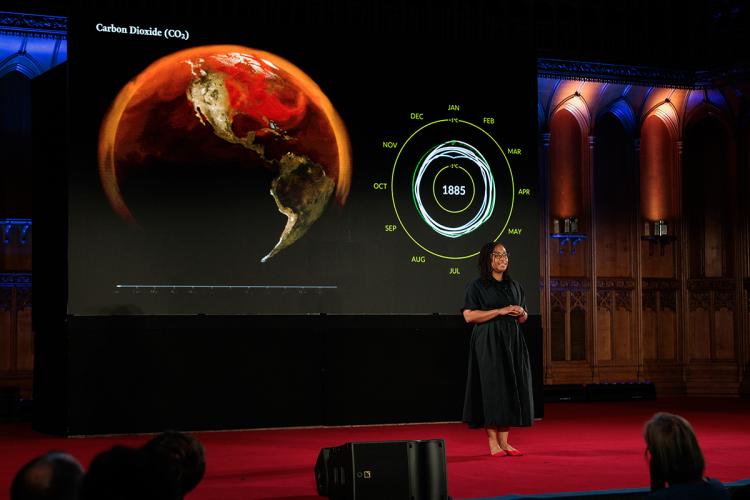
Jeannette Ickovics: Better Health Through Climate Action
Jeannette Ickovics, the Samuel and Liselotte Herman Professor of Social and Behavioral Sciences, discussed her work with the Resilient Cities Network to develop and implement evidence-based climate solutions in urban areas around the world.
“The climate crisis is a health and equity crisis,” Ickovics said. “We are facing urgent and accelerating climate threats, outpacing predictions, and placing immense strain on cities. Yet amidst these challenges, evidence-based action at the intersection of climate and health offers potential.”
She shared several examples of city-based solutions already making a difference. In Freetown, Sierra Leone, the “Freetown the Treetown Campaign” aims to plant 20 million trees by 2050 to improve air quality, capture carbon, and reduce heat. This project not only benefits the environment but also helps lower rates of asthma and heat-related illness, showing how ecosystem restoration can directly support public health.
“By putting health at the heart of climate action,” she said, “we can cultivate cities to ensure a healthier, more equitable, and resilient future for all.”
James Hatch ’24: Bridging the Civilian-Military Divide
James Hatch ’24, lecturer at Yale Jackson School of Global Affairs, received his Yale College acceptance letter at age fifty-two. The oldest member of his first-year class, he was not a typical undergraduate student. But after decades serving as a US Navy SEAL, Hatch had much to offer his new classmates.
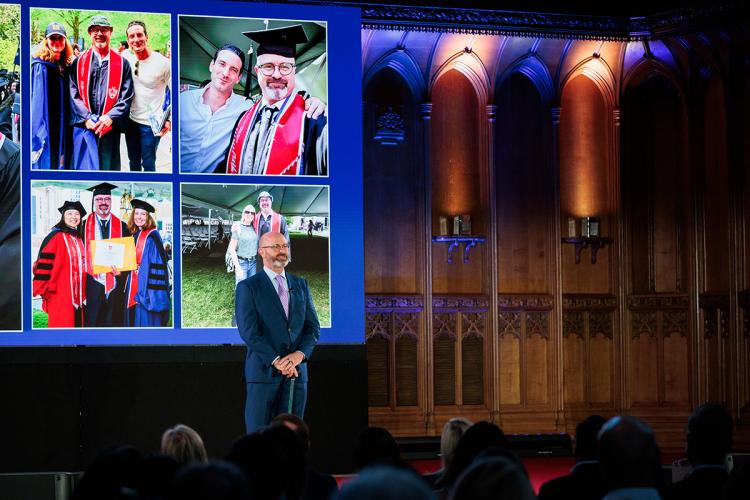
One afternoon early in Hatch’s first semester, a fellow student approached him after class and shared a deeply personal story. Her grandfather had attended Yale but left to serve in the Navy during World War II. After the war, he struggled to complete his degree and eventually dropped out. She told him that studying alongside him felt like helping her grandfather finish what he had started.
“This connection—a bridge across generations, linking me to a WWII veteran through his remarkable granddaughter—felt like a gift,” Hatch said. “It’s just one of the many gifts I receive almost daily at this extraordinary institution.”
Now a Yale graduate, Hatch teaches a course at the Jackson School of Global Affairs on the human impact of war. He thrives on the dynamic conversations sparked by students from varied backgrounds; veterans and ROTC cadets sit side by side with classmates morally opposed to the very existence of the US military.
“We sit together, learn together, and question each other honestly and respectfully,” Hatch said. “On one side, future military officers. On the other, young leaders who may one day decide whether to send other people’s kids to war. Where else does that kind of conversation happen?”
